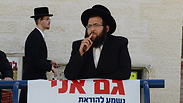
'For the haredim, Beit Shemesh is a power test'
צילום: יובל חן
Beit Shemesh's fate is in voters' hands
Op-ed: For torn city's non-haredi population, Tuesday's mayoral election is last opportunity to curb haredization process.
The residents of Beit Shemesh will go to the polling stations on Tuesday with a fateful feeling. It has been a long time since such emotionally charged elections were held in Israel, elections in which both sectors making up the population are convinced that they are fighting with their back against the wall, fighting for their home.
For the haredim, Beit Shemesh is a power test. They must prove to others, and mainly to themselves, that they are a key player in Israeli politics. On Tuesday the Knesset will approve the draft law, in spite of haredi politicians' opposition. A victory in Beit Shemesh will give them partial consolation, or to be more exact, partial revenge.
For the non-haredi population, this is a last opportunity to curb the haredization process. A victory in the ballot is a vital but insufficient condition. The city needs much more than that.
Like every political battle, the Beit Shemesh battle is also more complex than what is reflected in the headlines. Moshe Abutbul of Shas, the current mayor, was elected five and a half years ago just because of a war of egos between the non-haredi parties. Abutbul is a secular who became religious, a marginal actor and broadcaster who found his way into politics. Shas Chairman Aryeh Deri is unimpressed by his skills.
With the lack of real public backing, Abutbul depends on the city's new population, Ashkenazi haredim from Jerusalem. Don't let his Shasnik appearance fool you: The Eda Haredit zealots are peeking from underneath.
The haredim are not to blame for Beit Shemesh's trouble. It is the fault of government workers, people from the Interior Ministry and planning authorities, most of whom are complete seculars, who decided years ago to turn Beit Shemesh into a haredi city. The decision was never presented to the public in its full meaning. Danny Vaknin of the Likud, who was mayor at the time, even welcomed the first wave of immigrants.
Like in Soviet Union
The question what would happen to Beit Shemesh's 50,000 non-haredi residents when tens of thousands of haredim would move to the city was never put on the agenda. No one asked them. Like in the Soviet Union, the planners planned, the government workers approved, the contractors built and no one gave a damn about the veteran residents. The fact that the Interior and Housing ministries were in the hands of Shas ministers for years helped speed up the process, but only a naïve person would give them the credit. There were prime ministers above them and government workers under them. They are responsible.In the town of Katzir in Wadi Ara the government advanced a similar move, which was interrupted at an early stage just because the existing residents, mostly seculars, woke up on time and launched a public and legal battle. Today Katzir is open to everyone. That cannot be said about Beit Shemesh.
The growing haredi population deserves decent housing. The question whether it should be housed in existing or separate communities is open for discussion: There are various aspects. But in Beit Shemesh the State went too far. It housed people from the haredi sector's most radical movements in the city. These people have no interest in integrating into the city they live in. Their power is in spitting, vandalism, exclusion of women. They have turned the residents, including the less radical haredim, including the mayor, into hostages. On the way, they brought about a serious decline in the city's image, real estate prices and local economy.
So it's hard to be impressed by the list of politicians, from Bayit Yehudi to the Labor Party, from the government to the opposition, who are now voicing their support for Eli Cohen, the Zionist parties' candidate. What they should have done was to clarify to the voters what would happen to the city if Abutbul is elected, and what would happen to the city if Cohen is elected. How the government would treat the city in terms of housing and employment; would it draw businesspeople; what would happen to the real estate prices; would Beit Shemesh be Emmanuel or would it be Modiin.
Eli Cohen is an outstanding person. He is a city resident who has had successful experience in a series of senior positions in Israel and the Jewish world. But Beit Shemesh's future does not depend on Cohen alone. The government deserted the city; the government must fix it.
Tuesday is Election Day. Every vote counts: Even the votes of the lazy ones who will stay home. The residents of Beit Shemesh must understand that this time the elections are not a reality show, in which one person is selected and another is dismissed. In their vote they are not only determining Cohen or Abutbul's fate, but their own fate.










